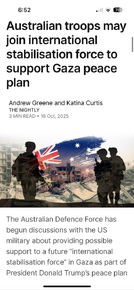To me, it still looks like someone in Australia saw what the US is doing with the USMC and decided it was a good idea to ape the Marines, all whilst ignoring questions on whether or not it was a good idea for the US to adopt, or that the ADF just cannot match US capabilities which might be able to get a bad idea to work.
That is entirely possible. Although, Australia has pretty rigorous assessment processes, but then again we have had some doozey acquisitions.
I just do not see it. The countries which are close to SLOC chokepoints likely could raise and field such land-based batteries, assuming they are willing to pay the coin to purchase them. Whether or not the countries which can make the radars, comms and missiles themselves would be willing to sell such systems to these countries is another story. One which Australia would not have much say in.
I think Australia has pretty significant say in who gets what in our region. Given that it would involve nations we give huge aid too, that are dependant on other aspects of Australian support for their commercial, civilian, and military capabilities. Australia is often accused of being too powerful/influential regionally. Australian aid to the pacific used to out weigh China, US and EU aid combined.
We have basically completely inhibited some countries from obtaining almost anything, including small arms. I think of RAMSI with the Solomons for example.
I think Australia has pretty significant influence with the US, Norway, Germany, France, UK etc. I don't see any of those countries over riding Australia's wishes and writing their own pacific nations weapons policy, particularly if it undermines Australia building a coalition. I think any such arrangements would be more like the US nuclear sharing agreement, the weapons would remain the property of Australia, they would perhaps be operated under a dual key arrangement, Australian personnel would be involved in the loop and on the ground. Such arrangements would also stop such nations seeking their own arrangement willy nilly, like East Timor did with its boats. Again, creating a hole that someone was going to step in and fill. For all we know, someone else is offering attractive alternatives.
Australia has been talking a lot about joint capabilities with other nations. The security arrangement with PNG would essentially unify the entire militaries together. There has to be something in there that works around unification that gives something back to those involved. There has been simular talk with Fiji and its oversized military as well. Fiji military is a problem unto itself, being oversized and over important from all the UN work they do.
The fact they aren't huge game changers is actually attractive in this case. Core capabilities would be core capabilities. But having these countries deeply involved and actively engaged in a coalition could be important.
Again all speculation. But there is a lot of speculation how regional engagement would occur, what regional nations would get out of such defence arrangements. I don't see Australia buying PNG or Fiji a destroyer or a F-35.
Also such arrangements might also be convenient ways for Australia and the US to pre-position munitions around the region. Here are 500 NSM, they can be used for your single local based NASAMS, or perhaps any allied ship that comes by and needs to reload, like this nearby taskforce. They are for the use of
Local and friendly forces.
it looks like ~6,500 personnel in the Fijian armed forces have a half-dozen 105 mm howitzers. Quite a large step up from there to mobile SSM launchers firing OTH AShM.
People would have said that about the Australian army 20 years ago. Or the NZ army now. Fiji has 1/4 the strength of the NZ army artillery. It could be a catalyst to making them a more networked force.







